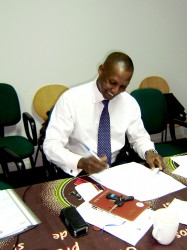The week started with a bang, with the official signing of Mozambique's application for round 9 funding from the Global Fund to Fight HIV/AIDS, TB and Malaria. The meeting room of UNAIDS in the leafy Sommerschield Bairo of Maputo is becoming a familiar rendevous point for the dozens of people who have been working to prepare the application. Once again the meeting room was packed, but there was a sigh of relief once the Country Coordinating Mechanism (CCM) endorsed the proposals that need to be submitted by the 1st of June, marking the end of an ardous preparation process and the beginning of a long period of waiting and hoping.

Antonio Laice is the National Director of the Treasury in Mozambique, and signed the applications on behalf of the Ministry of Finance. Mr. Laice is well know to the donor community in Mozambique and is an extremely capable but very approachable National Director who works closely with donor economists to oversee the significant volume of general budget support provided to Mozambique by a number of its partner.

I also include a picture of Diogo Milagre, the dynamic deputy of the National AIDS Council, and who I have done a blog on previously.
The Country Coordination Mechanism which had to endorse the applications to the Global Fund consists of a number of representatives of government, of civil society, of people living with HIV/AIDS and of international NGOs and donors. All have been involved in the preparation process, meeting to discuss earlier drafts of the proposals. The critical importance of securing new funding from the Global Fund is widely understood. These funds represent a life line to HIV positive people and people affected by malaria and TB in Mozambique. The support for the application was universal.
The process of preparing these applications has involved a massive planning and coordination exercise, taking up a significant amount of the Ministry of Health, the National AIDS Council and development partners' time over the last few months. We all hope that the investment will be worthwhile.
To give a sense of the scale of the application being made, the HIV/AIDS submission includes an application for funding of over $80 million to procure anti-retroviral drugs (ARVs) for the period 2010-2015. Even if secured, there will still be a funding gap of about $56m for drug procurement over that time, which needs to be met by the government and other funding agencies. The funding requested would ensure that the 130,000 people who are already receiving treatment can continue to do so, and would further expand access to ARVs.
For the malaria funding request, more than 60% of the funds, over $80million, would be used for procurement of bed nets and insecticides as well as medicines for treatment of malaria. This would help Mozambique achieve an ambitious target of each household having two bednets. The overall proposal aims to significantly reduce malaria deaths and disease.
Underpinning the applications is a funding request to support a strengthening of Mozambique's health workforce. I have done a blog previously on the health workforce in Mozambique and the National Plan to address the crisis. With just 26,000 health workers for a population of 21 million people, increasing access to services will depend heavily on the country's ability to expand its health workforce. The Global Fund money, if secured, would play a significant part in filling the funding gap of the national human resource strategy, which aims to increase the numbers of doctors, nurses and other health workers by 20,000 people by 2015. Whilst this might sound a lot, even with a workforce of 46,000, Mozambique would still have less than 1.9 health workers per 1000 population, less than the 2.3 per 1000 considered a minimum for effectively providing a basic package of essential health services.
Let us hope that the economic crisis does not reduce the capacity of the Global Fund to respond to these essential funding needs.

Recent Comments